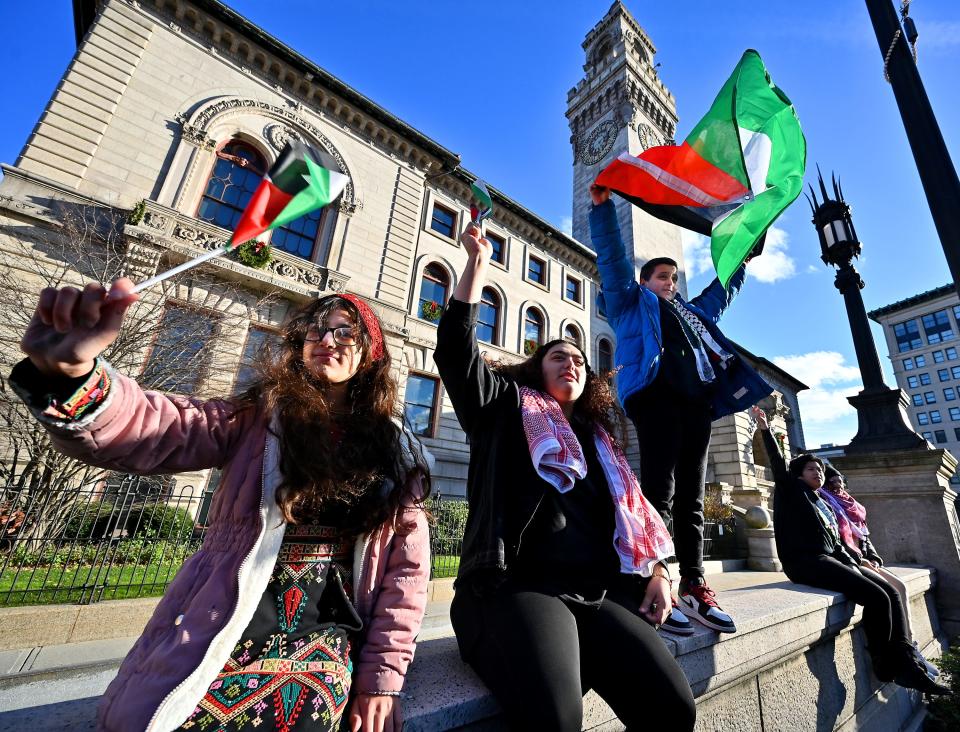Separated by distance and war, Worcester resident advocates for her family in Gaza
WORCESTER ― Sabah Hammad had planned to travel from Worcester to visit her family in Gaza this summer.
She had long been looking forward to getting to know her extended family through her great-aunt. But after the Hamas attacks Oct. 7 and Israel's subsequent reprisals, she won't get the chance.
Taking a moment to count, Hammad, 20, estimates that about 30 members of her extended family have died since the fall.
“I wanted to meet them badly,” she said, reflecting on those she had only known through passing references. “My family told me, ‘They’ll like to talk to you about this or teach you to cook this.’ It hurts to have that experience be taken away.”
'Who we lost'
Hammad, who lives in Worcester with her parents and grandmother, has been struggling to stay in touch with her 10 remaining family members in Gaza, who are now sheltering in refugee camps. An unsteady arrangement allows for brief telephone contact from the camp once every three weeks on Friday.
“We’ve been having a hard time getting in contact with them,” said Hammad. “When we do, it’s really short.” There’s just enough time to share the most important things, she said, “like who we’ve lost.”
Two months ago, Hammad’s grandmother received a phone call from her sister living in Ramallah, in the West Bank, with the news that the sister had lost her daughter and four grandchildren, ages 6 to 12, in a building collapse in Gaza.
“Her husband had just went out to find a charger to contact (my grandmother) and he came back home and the home was just gone,” recounted Hammad. The husband is now one of the 10 in the camps, alongside his father-in-law, sister-in-law and multiple young children.
There was a point when there was a gathering at someone’s house almost every other weekend to mourn a lost family member, recounted Hammad. “It reached a point where it’s difficult to know what to do or say,” she said. “Especially with the knowledge that the manner of death was so brutal.”
Taking action
Separated by distance and war, Hammad said it's easy to feel powerless, but she's made it her business to raise awareness of civilian casualties and the conditions in the camps.
Hammad is part of an interfaith coalition of Worcester County residents who allege that Israel’s actions constitute genocide and that the United States is complicit.
“We’re witnessing the systematic destruction of Gaza,” said Claire Schaeffer-Duffy of Sts. Francis and Thérèse Catholic Worker House, who is a member of the coalition. “The goal is to render the place uninhabitable and this is being made possible by American money and weapons manufactured here. We are all participants.”
While Hammad has attended two local protests including one in front of Worcester City Hall in November, her primary focus has been providing material support to those in the camps — both her family and others.

“The death toll rises from starvation,” as much as bombs, said Hammad. “How can a human survive on three to five liters of water per week?”
According to family members living in the camps, supplies often arrive either unusable or are hoarded and sold to the refugees at inflated prices. Delays cause produce such as tomatoes to rot by the time they reach the camps. Other goods are mixed with common materials, edible or not, to give the impression of a larger quantity, Hammad said.
The Worcester Muslim community has been fundraising for supplies and also looking for a way to send them to ensure they reach the intended recipients.
“We’re trying to figure out a way to send it in a way so we know it’s going to the right people, through the right channels,” she said.
'Hold all parties accountable'
The prevalent attitude that Hammad has encountered conflates the people of Gaza with Hamas, she said, which can have a numbing effect on news of atrocities against civilians.
That should not be the case, said Schaeffer-Duffy, who said that criticizing Israel’s response to the Oct. 7 attack as disproportionate does not diminish or excuse Hamas’ actions.
“Hamas' actions on Oct. 7 were war crimes — targeting civilians, taking hostages — and they must be prosecuted,” she said.
“But we need to apply human rights law equally,” and hold all parties accountable when those laws are violated or they lose their meaning, something she believes both political and religious leadership lack the “moral courage” to do, she said.
Though Oct. 7 provides a clear starting line to the renewed hostilities, Hammad said Palestinians had been suffering long before.
“This brutality didn’t start after Oct. 7. It’s been happening for the last 40 years, just now being highlighted and broadcast to the world,” she said.
“They’re targeting children, the future of Palestine, and they’re trying to justify it by saying, ‘You guys are barbaric, and you deserve it,’” she said.
This article originally appeared on Telegram & Gazette: Worcester resident advocates for family in Gaza

